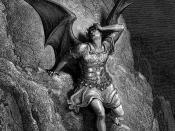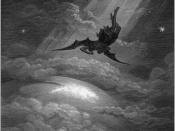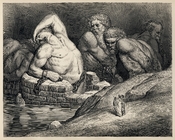The world was created as a place in which joy, cheer, and good deeds cold be shared by fellow neighbors. The beginning of this loss of innocence first took place when Adam and Eve committed sin by eating the apples from the Tree of Knowledge. The end of good is illustrated in the stories, Paradise Lost, by John Milton, and The Inferno, by Dante Alighieri.
In Milton's Paradise Lost, the world was good, and everything was enjoyful for Adam and Eve, until Satan came to earth and told Eve that she should eat an apple from the tree of wisdom, even though god had told her not to. Whenever she ate the fruit and saw that there was no immediate consequences, Adam decided that he should try a taste of the delicious red produce. Whenever they ate the fruits, god punished tem and prohibiting them from the Garden of Eden.
This bad was brought forth by Satan. This action would bring forth sin in later years to come, and what could be called the corruption of good.
In Dante's Inferno, the consequences of not being good are shown. more and more people sin every day, causing the little bit of good that is left in the world to slowly fades away. In the story, souls cast down to hell are illustrated in close detail by what they had done wrong in the past. The greater the sin that they had committed, the worse the punishment given to them is.
Even the good in the real world in which we live is slowly decaying. Every day, more sins are being committed. The world used to be a good place, but then the human race decided that there will ultimately be no major consequences for their bad actions. Like in...


